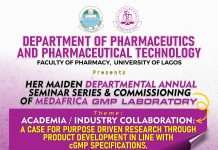
The leadership of the Faculty of Pharmaceutical Sciences, Veritas University, Abuja, has pledged to ensure that the faculty contributes significantly to the advancement of Nigeria’s pharmaceutical industry in the near future.
Established in the 2021/2022 academic session following approval from the National Universities Commission (NUC), the faculty commenced its Doctor of Pharmacy (Pharm.D) programme after an advisory visit from the Pharmacy Council of Nigeria (PCN) in 2023, which granted the needed approval .
Currently comprising six departments and catering to students from 100 to 400 levels, the faculty has already made significant strides in pharmaceutical education and research while actively working towards expansion and development.
Speaking with Pharmanews recently, the Dean of the faculty, Professor Augustine A. Ahmadu, revealed that the NUC visited the faculty in November 2024 for the accreditation of the Pharm.D programme. He expressed optimism about a positive outcome, stating that the faculty, with the constant support of the university management, is actively addressing the deficiencies noted by the accreditation panel.
He further disclosed that preparations are underway for the PCN’s accreditation visit. “The faculty has some experienced professors and young lecturers across its six departments, but there is still room to employ more academic and technical staff in accordance with NUC and PCN guidelines,” he said.
Ahmadu also highlighted the faculty’s ongoing research efforts, expressing confidence in imminent breakthroughs. According to him, “We are working on several research areas, and we are very optimistic that within the next few months, we will achieve notable progress.
“Although we face some general challenges, the faculty is encouraging its academic staff to intensify their research efforts, especially considering the university’s investment in the provision of essential facilities for both teaching and research across the six departments. We are optimistic that we will introduce new innovations in the coming months.
“We recognise the national efforts to advance Nigeria’s pharmaceutical sector, and with the experienced professors we have, we are confident that our faculty will contribute its own quota to the development of the industry.”
As part of efforts to reduce drug importation, the dean affirmed that the faculty, like most pharmacy faculties in Nigeria, is committed to supporting the development of locally sourced raw materials for pharmaceutical manufacturing.
“We are yet to launch any products, but with the equipment we have, the calibre of experienced professors and staff available, and an enabling research environment, we are optimistic that we will soon develop pharmaceutical products within the faculty,” he said.
However, he called for urgent action to address Nigeria’s persistent power supply issues, stressing that without reliable electricity, research and innovation in pharmacy faculties and research institutes will be significantly hindered. “There cannot be meaningful research and innovation in universities or research institutes where electricity supply is epileptic,” he stated.
He emphasised the necessity for increased governmental effort in developing the pharmaceutical sector, particularly in creating an enabling environment for drug production and marketing.
In his words: “There is a need for tax waivers or rebates on essential pharmaceutical raw materials that cannot be sourced locally. This will enhance local drug production and stimulate indigenous pharmaceutical manufacturers to increase their capacity, thereby reducing dependence on imported drugs.
“The government must also encourage universities and research institutes to develop pharmaceutical raw materials using cutting-edge technology. This will significantly reduce the importation of raw materials required by local pharmaceutical industries.
“The issue of epileptic power supply is a major challenge affecting most industries in Nigeria, including the pharmaceutical sector. I am certain that inadequate electricity is one of the biggest challenges facing local pharmaceutical manufacturers. Providing reliable and constant power supply will undoubtedly enhance productivity in the sector. Government support is crucial in addressing these issues, as they are currently limiting the active participation of local manufacturers in meeting the nation’s pharmaceutical needs.”
Professor Ahmadu also urged pharmacists across Nigeria to unite in their efforts to elevate the profession, stressing that collective action is essential to ensuring drug safety, affordability, and accessibility.










